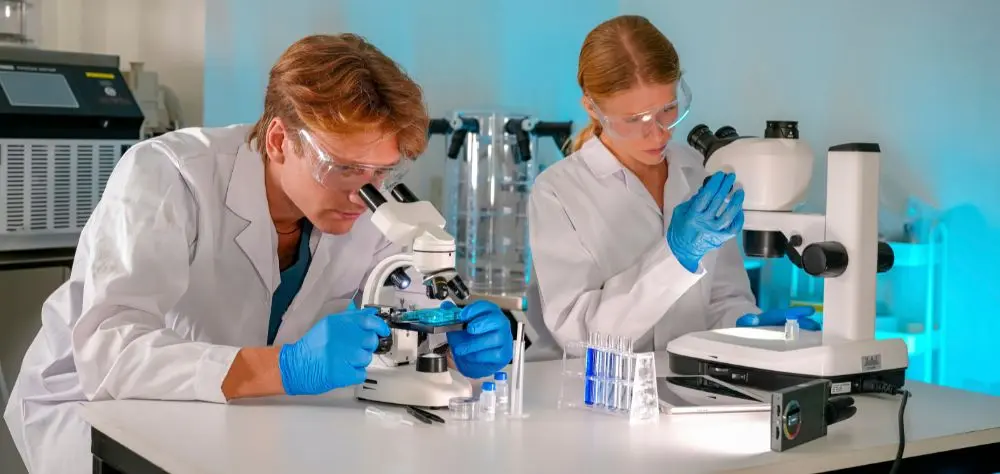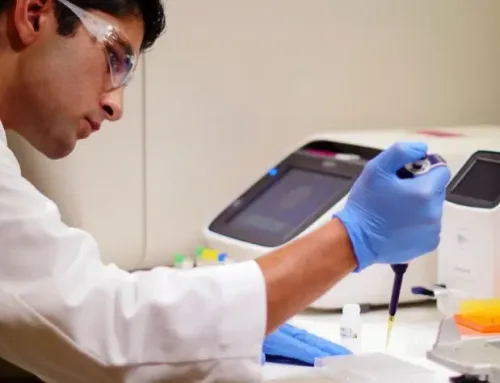Best Master’s Programs in Genetics: Schools, Careers & Research Opportunities
Genetics is reshaping how we understand health, disease, and even our future. From rare disorder diagnostics to personalized medicine, the field is expanding—and genetics masters programs are preparing students to lead in research, clinical care, biotech, and beyond.
Whether you’re interested in lab-based research, genetic counseling, or applications in pharmaceuticals and public health, a master’s in genetics can open the door to specialized, high-impact roles. The right program offers not just advanced coursework, but meaningful research opportunities, faculty mentorship, and clear pathways into PhD programs or industry positions. So how do you find a program that aligns with your goals and supports your next steps? Here’s how to get started.
Why Genetics Is Driving the Next Big Shift in Healthcare
We’re living in the genomic era. The ability to read, map, and edit DNA is transforming healthcare, biotechnology, forensics, and public health—and genetics masters programs are training the experts who will lead that transformation.
Why Genetics Is Taking Center Stage
From precision medicine to rare disease diagnostics, genetics is now a core part of how we understand and treat patients. But the reach of genetic science extends far beyond hospitals. It’s shaping how we approach public health, develop new biotech, solve crimes, and understand human behavior.
This shift has created growing demand for professionals trained not just in molecular biology, but in human genetics, bioinformatics, and ethical decision-making. Careers in genetic counseling, research, and laboratory science are expanding quickly—many with projected growth rates well above the national average. According to the Bureau of Labor Statistics, genetic counseling alone is expected to grow by 16% from 2023 to 2033.
Where the Opportunities Are
Professionals with advanced genetics training are stepping into roles like:
- Clinical genetic counselors, working with patients on inherited conditions and risk assessment
- Research specialists, contributing to cutting-edge gene therapy and population studies
- Biotech and pharmaceutical analysts, supporting drug development and diagnostics
- Bioinformatics experts, interpreting large-scale genomic data for clinical or public health use
Whether you want to work at the bench, beside patients, or behind the scenes in data and policy, genetics offers a foundation that’s both versatile and vital.
Is a Master’s in Genetics and Genomics Right for You?
A master’s in genetics or genomics prepares students to explore the science of heredity, disease, and molecular data with real-world impact. It’s an intensive program designed for those who want to move into research, healthcare, or biotech careers.
What You’ll Study in a Genetics or Genomics Program
These graduate programs dive deep into both classical and modern genetics. Students build a strong foundation in human inheritance and gene function, while also learning cutting-edge tools that power today’s genomic breakthroughs.
- Core topics include human genetics, gene expression, molecular biology, genetic counseling principles, and bioethics
- Emerging areas like whole-genome sequencing, pharmacogenomics, CRISPR, and epigenetics round out the curriculum
You’ll also gain research training that can lead directly into lab-based roles or prepare you for doctoral study, genetic counseling, or positions in biotech and public health.
Genetics vs. Genomics: Understanding the Focus
While closely related, these two fields take different angles. Genetics focuses on how individual genes and inherited traits influence health and disease. Genomics looks at the bigger picture—how entire sets of genes interact, how they’re regulated, and how they vary between people and populations.
Most strong master’s programs today combine both to give students a well-rounded, up-to-date education.
What to Look for in the Best Master’s Programs in Genetics
The best genetics masters programs do more than teach—they prepare you for the next step, whether that’s research, healthcare, or biotech. Here’s what to look for when comparing programs to make sure you choose one that truly fits.
1. Accreditation and Faculty Credentials
Make sure the program is offered through a regionally accredited institution. Strong programs are led by experienced faculty with research or clinical backgrounds in human genetics, molecular biology, genomics, or biotechnology. Look for advisors and instructors who are actively publishing, collaborating, or innovating in the field.
2. Comprehensive, Future-Facing Curriculum
You want both solid foundations and exposure to new frontiers. The curriculum should span classical genetics, gene regulation, and molecular biology, but also explore genomics, bioinformatics, epigenetics, and emerging technologies like gene editing and next-gen sequencing. Depth and flexibility matter.
3. Online, Hybrid, or Flexible Formats
If you’re balancing work or other responsibilities, format flexibility matters. Many programs now offer asynchronous lectures, part-time pacing, and hybrid schedules that give you more control over how and when you learn. Just be sure the quality of support and instruction matches the format.
4. Research or Capstone Opportunities
Top programs don’t just end in a final exam—they help you build something real. Whether it’s a thesis, a publishable project, or a practical capstone, this is your chance to apply what you’ve learned and build a portfolio that can lead to job offers or doctoral study.
5. Career Pathways or Concentration Tracks
Not every student is heading into the same niche. Some programs offer optional tracks in bioinformatics, clinical genetics, genetic counseling prep, or laboratory science. Others offer partnerships with local hospitals or biotech companies for experiential learning and internships. Make sure the path aligns with your goals.
6. Affordability and Time-to-Completion
Master’s programs should offer a clear return on investment. Look for transparent tuition, scholarship options, and timelines that allow you to finish in 18–24 months if desired. Some programs even offer accelerated or dual-degree options to help you move forward faster and more affordably.
High-Impact Genetics Education, Delivered 100% Online: The SCU Advantage
SCU’s fully online Master of Science in Human Genetics and Genomics offers a fast, flexible, and career-aligned path for students ready to dive into this rapidly growing field—without putting life on hold.
An Entirely Online, Accelerated Program
Our MSHGG program is completely online and structured for efficiency. With 7.5-week terms and asynchronous delivery, students can complete the program in as little as one year. It’s built for professionals who need a graduate program that fits into a demanding schedule without sacrificing academic depth.
Comprehensive Curriculum, From Classic to Cutting-Edge
We cover the full spectrum of genetic science—from foundational topics like gene structure and molecular biology to advanced content including CRISPR gene editing, synthetic biology, microbial genomics, and diagnostic applications.
- Courses also focus on the ethical, legal, and social implications (ELSI) of genomics
- Students learn to evaluate emerging technologies in a responsible, real-world context
Capstone Project = Real-World Readiness
Every student completes a personalized capstone project under the guidance of expert faculty. Projects often lead to opportunities in research, publication, or advancement to doctoral or professional programs. You’ll graduate with a meaningful piece of work that demonstrates both skill and potential.
Pre-Genetic Counseling Concentration Option
Interested in counseling? One extra semester earns you a formal Pre-Genetic Counseling concentration—and guarantees interview consideration for SCU’s competitive MS in Genetic Counseling program. It’s an ideal pathway for students seeking deeper patient-facing or clinical roles.
Stackable and Accelerated Learning Pathways
Students in SCU’s Bachelor of Science in Health Sciences program (with a genetics focus) enter the master’s program with up to 12 credits already completed. This means faster progression and reduced overall tuition.
Interactive, Engaging Learning—Not Passive Content
We don’t do static lectures. Our online courses use a mix of interactive modules, discussion boards, peer collaboration, quizzes, and real-world case studies. You’ll stay engaged, connected, and challenged from start to finish—no matter where you’re logging in from.
Learn the Science. Lead the Change with SCU
Today’s genetics masters programs are more than academic—they’re launching points for careers that blend scientific depth with real-world relevance. Whether your goal is clinical, research-based, or industry-focused, SCU’s fully online, flexible program is built to help you advance with purpose and confidence.
You’ll gain a foundation in everything from classic molecular genetics to next-gen sequencing and ethical decision-making—all within a format designed to support your goals and schedule. Ready to move forward? Take a closer look at our admission requirements and apply today.
FAQs
How long do genetics masters programs usually take to complete?
Most take 1.5 to 2 years full-time, though some accelerated programs can be completed in as little as 12 months. Part-time options may extend the timeline.
What’s the difference between genetics and genomics in master’s programs?
Genetics focuses on individual genes and inheritance. Genomics looks at the entire genome and its interactions. Good programs typically cover both for a well-rounded education.
Do I need a biology degree to apply to genetics masters programs?
Not always. Most programs require a strong science foundation, but applicants from related fields like biochemistry, health sciences, or bioinformatics are often accepted.
Is SCU’s Master of Science in Human Genetics and Genomics fully online?
Yes. Our program is 100% online, designed to be flexible and accessible for working professionals or students needing a remote learning option.
How quickly can I finish SCU’s genetics master’s program?
You can complete it in as little as one year through accelerated 7.5-week terms. The program is structured to move efficiently without sacrificing depth.
Related Posts





